MusiQ
Glenn Miller And His Orchestra - Moonlight Serenade American Patrol
Table of Contents
Download
Filename: glenn-miller-and-his-orchestra-moonlight-serenade-american.rar- MP3 size: 6.4 mb
- FLAC size: 106.8 mb
Tracks
| Track | Duration | Preview |
|---|---|---|
| American Patrol | ||
| Moonlight Serenade |
Video
Glenn Miller Orchestra - Moonlight Serenade
Glenn Miller & His Orchestra - American Patrol
Moonlight Serenade / American Patrol, Glenn Miller Orchestra
Images
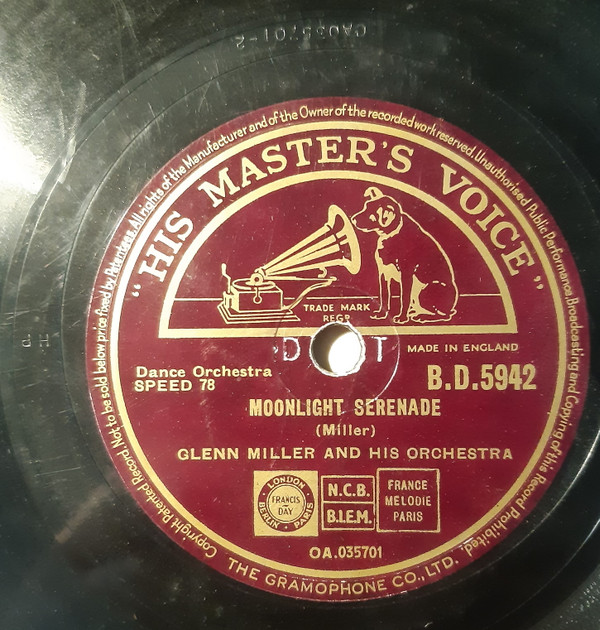
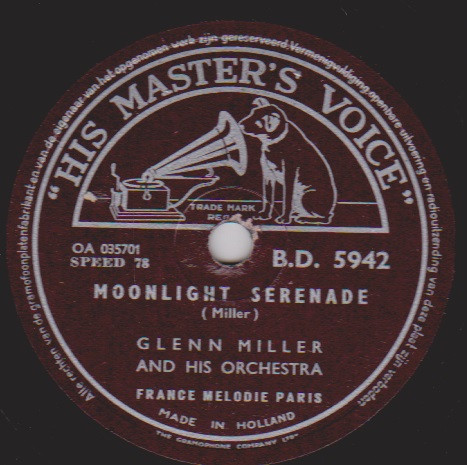
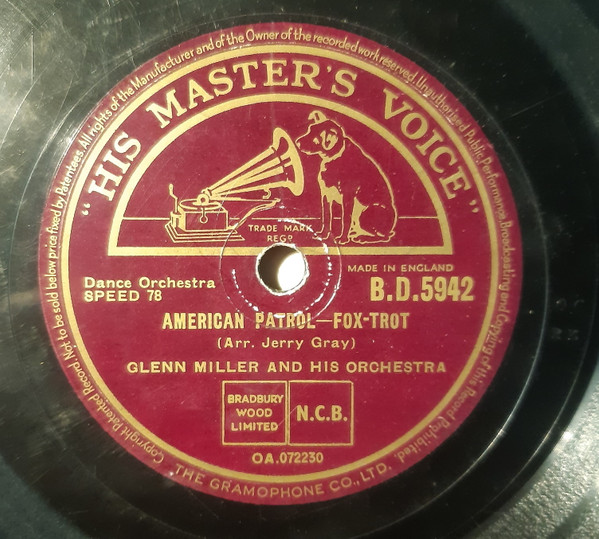
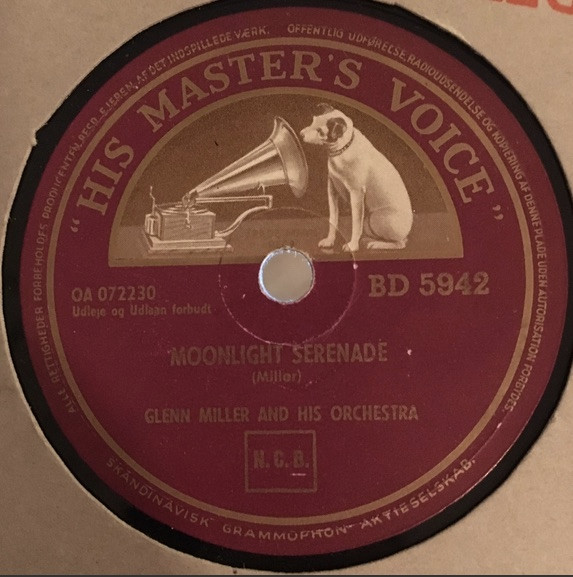
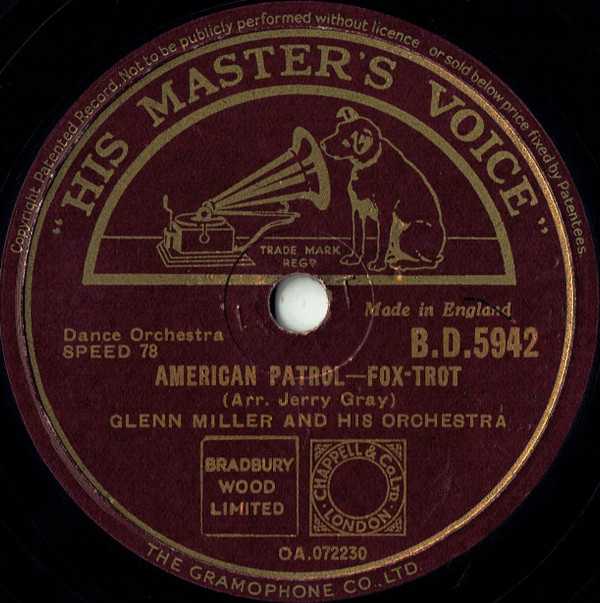
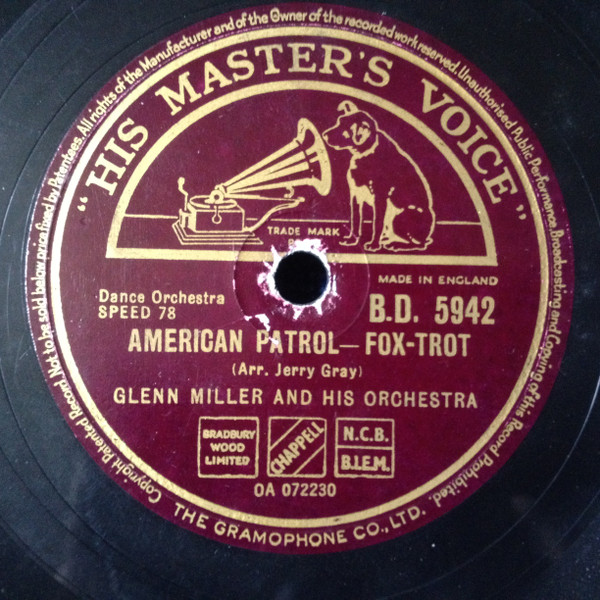
Catalog Numbers
- A.O. 3153
- B.D. 5942
- BD 5942
- B.D.5942
- TG 206
Labels
- His Master's Voice
- La Voix De Son Maître
Listen online
- lyssna på nätet
- kuunnella verkossa
- online anhören
- escuchar en línea
- ouvir online
- lytte på nettet
- écouter en ligne
- online luisteren
- ascolta in linea
Formats
- Shellac
- 10"
- 78 RPM
- Repress
- Reissue
Companies
| Role | Company |
|---|---|
| Record Company | The Gramophone Co. Ltd. |
| Published By | Chappell |
| Pressed By | The Gramophone Co. Ltd. |
Notes
- Hit UK chart #12 Week Ending 12/03/1954. Only singles chart week for Glenn Miller until re-Issued in 1976 with Little Brown Jug and In The Mood.
- Made in Denmark.
- Different label design than other Danish version found here: https://www.localhost/Glenn-Miller-And-His-Orchestra-Moonlight-Serenade/release/5605939
- This version has other catalogue # left of centre hole: OA 072230.
- No mention of 78 rpm on labels unlike other version.
- Labels:
- The Gramophone Co., Ltd.
- Made in England
- Dance Orchestra
- A: Francis. Day
- France Melodie Paris
- N.C.B. B.I.E.M.
- B: Fox-Trot
- Bradbury Wood Limited
- N.C.B.
- Chappell & Co.Ltd London
- Issued 1947 or 1948 as noted by 'LT' UK purchase tax code.
- MADE IN SWEDEN
- Made in Denmark
- A was recorded first half 1939 & B first half 1942.
- A - Recorded RCA Victor Studio #2, New York, April 4, 1939.
- B - Recorded RCA Victor Studio, Hollywood, California, April 2, 1942.
- Made in Sweden.
- The Gramophone Co. Ltd.
- Belongs to the Dance series BD 5001 to 6204 (at least) with magenta label.
Barcodes
- Matrix / Runout: OA.035701
- Matrix / Runout: OA.072230
- Matrix / Runout (A label): OA.035701
- Matrix / Runout (B label): OA.072230
- Rights Society: N.C.B.
- Rights Society: B.I.E.M.
- Other (UK tax code): N
- Matrix / Runout (A side runout, stamped): OA 035701-2 GPO
- Matrix / Runout (B side runout, stamped): OA072230-2 TB 8 B 13 RK
- Other (UK tax code): ST
- Matrix / Runout (A side runout, stamped): OA035701 OG 15 14
- Matrix / Runout (B side runout, stamped): OA072230-2 XX AP 8 3
- Matrix / Runout (A side runout, stamped (variant)): OA035701 RG B-10214B 8
- Matrix / Runout (B side runout, stamped (variant)): OA072230 GG 1
- Matrix / Runout (On Label side A): OA 035701-2
- Matrix / Runout (On Label side B): OA 072230-2
- Rights Society (Side A): B.I.E.M.
- Other (UK purchase tax code, slugs on label): D T
- Matrix / Runout (Side A label): OA.035701
- Matrix / Runout (Side B label): OA.072230
- Matrix / Runout (Side A runout): OA 035701-2 HP
- Matrix / Runout (Side B runout): OA 072230-2 RM OC
- Rights Society (Track A): N.C.B. B.I.E.M.
- Other (UK purchase tax code, slugs on label): L T
- Matrix / Runout (Side A runout): OA 035701 OG 13 14
- Matrix / Runout (Side B runout): OA 072230-2 AA R̶H̶ 7 3
- Matrix / Runout (Side A runout): OA 035701-2 LR
- Matrix / Runout (Side B runout): OA 072230-2 PR
- Other (UK tax code): D TP
- Matrix / Runout (Runout side A): OA 035701 14
- Matrix / Runout (Runout side B): OA 072230-2 RH, 83
- Matrix / Runout (Label side A): OA 035701
- Matrix / Runout (Label side B): OA 072230
- Rights Society: NCB
- Matrix / Runout (On Label side A): OA 035701
- Matrix / Runout (On Label side B): OA 072230
- Rights Society (Sides A & B): N.C.B.
- Rights Society (Side A only): B.I.E.M.
- Other (UK Purchase Tax Code): N
- Matrix / Runout (On runout side A): OA 035701-2
- Matrix / Runout (On runout side B): OA 072230-2
- Matrix / Runout (On label side A): OA 035701
- Matrix / Runout (On label side B): OA 072230
- Other (On runout side B): RH, 83
- Matrix / Runout (A label): OA 035701
- Matrix / Runout (B label): OA 072230
- Other (UK tax code): D T
- Matrix / Runout (Runout side A): OA 035701-2
- Rights Society: N.C.B. / B.I.E.M.
- Matrix / Runout (Label side A): OA.035701
- Matrix / Runout (Label side B): OA.072230
- Matrix / Runout (Runout side A): OA 035701-2 GGO 6
- Matrix / Runout (Runout side B): OA 072230-2 HH 8
About Glenn Miller And His Orchestra
Glenn Miller and His Orchestra was formed by trombonist, arranger, composer, Glenn Miller. Glenn Miller was the best-selling recording artist 1939 - 1942. Miller was a sideman in many different groups beginning in 1926 with the Ben Pollack Orchestra. He was overshadowed in Pollack's band by Jack Teagarden who began taking all of the trombone solos. Miller focused on arranging and composing and by 1928 he had already published a songbook. Miller played frequently with other sideman who would become famous in their own rights with orchestras, Jimmy and Tommy Dorsey and Benny Goodman. Making some recordings with "Benny Goodman's Boys" in 1928 for Brunswick, Miller was a free-lance trombonist in several bands such as Red Nichols, Joe Venuti and Nat Shilkret. From the early to mid 30's Miller was arranger and composer for the Dorsey Brothers Orchestra and made many recordings with Bing Crosby and The Boswell Sisters for Brunswick and Decca. In 1935 he assembled the American orchestra for Ray Noble.
Anxious to break out on his own, Miller formed his first orchestra in 1937 and made his first recordings as the Glenn Miller Orchestra for Brunswick, Vocalion and Decca. By 1938 the band was unsuccessful and starving to death and disbanded. He revamped his style and arranging and credited the second and massively popular Glenn Miller Orchestra.
In September 1938 they made their first in a long list of recordings for Victor subsidiary Bluebird Records. In the spring of 1939, after a stint at the Meadowbrook Ballroom and Glen Island Casino, their popularity soared. By 1939 Miller's band was tops in the jukeboxes and was the most popular orchestra until 1942 when Miller went into the service during WWII. From Dec 1939 - September 1942 Miller had a radio program broadcast 3 times a week. His records sold millions and was awarded the first gold record for "Chattanooga Choo Choo" in 1941 as well as being seen in a few motion pictures.
By Joel Whitburn's tabulation, in less than four years the group saw 16 US number-one hits, as well as 6 Australian number-ones (three of which didn't hit top the US charts). The amount of hit singles Miller and His Orchestra had in such a short amount of time proved to be one of the greatest chart runs in history. "In the Mood" became an anthem of the swing craze and the most lasting of even his biggest records. The group sold over 60 million records, the most of any dance band. In the wake of Pearl Harbor, the very patriotic Miller joined the Army Air Forces where he would develop a modern military band for morale raising. The orchestra disbanded to a very emotional crowd at the Central Theater in Passaic, NJ on September 27, 1942. On December 15, 1944, Miller mysteriously disappeared over the English Channel. He was recognized as war hero. The band's music never left the American public; Despite never recording a studio album, Miller and His Orchestra had three posthumous Billboard number-one compilation albums as well as album certifications spanning several countries several decades years after his death at age 40.
Use for recordings WITHOUT (who died in 1944).
See also:
Name Vars
- And The Band
- Band
- Das Orchester Glenn Miller
- Die Original Glenn Miller Big Band
- G Miller & The Orchestra
- G. Miller & His Orchestra
- G. Miller And His Orchestra
- G. Miller E La Sua Orchestra
- G. Millers
- Glen Miller & His Orchestra
- Glen Miller And His Orchestra
- Glen Miller Band
- Glen Miller E La Sua Orchestra
- Glen Miller Orchestra
- Glenn MIller E La Sua Orchestra
- Glenn Miller
- Glenn Miller & His Orchestra
- Glenn Miller & And His Orchestra
- Glenn Miller & His Orch.
- Glenn Miller & His Orchestra
- Glenn Miller & His Orchstra
- Glenn Miller & Orch.
- Glenn Miller & Orchestra
- Glenn Miller & Son Orchestre
- Glenn Miller & The Glenn Miller Orchestra
- Glenn Miller & his Orch.
- Glenn Miller + His Orchestra
- Glenn Miller AEP Orchestra
- Glenn Miller And His Band
- Glenn Miller And His Chesterfield Orchestra
- Glenn Miller And His Orch
- Glenn Miller And His Orch.
- Glenn Miller And The Band
- Glenn Miller And The UK Orchestra
- Glenn Miller Band
- Glenn Miller Big Band
- Glenn Miller Big Band Orchestra
- Glenn Miller Bigband Orchestra
- Glenn Miller E La Sua Orchestra
- Glenn Miller E Sua Orquestra
- Glenn Miller E la Sua Orchestra
- Glenn Miller En Zijn Orkest
- Glenn Miller Et Miembros De Su Orquesta
- Glenn Miller Et Son Grand Orchestre
- Glenn Miller Et Son Orchestre
- Glenn Miller His Orchestra And Vocalists
- Glenn Miller Miembros De Su Orquesta
- Glenn Miller Mit Seinem Orchester
- Glenn Miller O
- Glenn Miller Og Hans Orkester
- Glenn Miller Orch
- Glenn Miller Orch.
- Glenn Miller Orchestra
- Glenn Miller Orchestra, The
- Glenn Miller Orkestereineen
- Glenn Miller Orquestra
- Glenn Miller U. S. Orchester
- Glenn Miller Und Sein Orchester
- Glenn Miller Und Sein Orchestra
- Glenn Miller Y Su Gran Orquesta
- Glenn Miller Y Su Orqesta
- Glenn Miller Y Su Orquesta
- Glenn Miller Y Su Orquestra
- Glenn Miller and His Orch.
- Glenn Miller and his Orch.
- Glenn Miller e la sua Orchestra
- Glenn Miller en zijn Orkest
- Glenn Miller und sein Orchester
- Glenn Miller y Su Orquesta
- Glenn Miller y su Orquesta
- Glenn Miller& His Orchestra
- Glenn Miller's Orchestra
- Glenn Millers Orchestra
- Glenn Millers Orkester
- Glenn Millers orkester
- La Orquesta De Glenn Miller
- Miller Big Band Orchestra
- Miller Bigband Orchestra
- Orch. Glenn Miller
- Orchester G. Miller
- Orchestra
- Orchestra Glenn Miller
- Orchestres Glenn Miller
- Orkestar Glenna Millera
- Orquesta De Glen Miller
- Orquesta Glenn Miller
- The Band
- The Glen Miller Orchestra
- The Glenn Miller Band
- The Glenn Miller Orchestra
- The Miller Orchestra
- The One And Only Glenn Miller Band
- The Orchestra
- The Original Glenn Miller & His Orchestra
- The Original Glenn Miller Orchestra
- The Real Glenn Miller And His Orchestra
- World Famous Glenn Miller Orchestra, The
- Гленн Миллер И Его Оркестр
- Оркестр Под Управлением Глена Миллера
- ªê¸Êëûµ¦óÉÈéï
- °ìóûßéüॽۣ
- °ìóཥßéüॽۣ
Members
- Glenn Miller
- Chummy McGregor
- Billy May
- Al Klink
- John Best
- Bobby Hackett
- Wilbur Schwartz
- Paula Kelly
- Joe Garland
- Maurice Purtill
- Clyde Hurley
- Jerry Gray
- Tex Beneke
- Ray Eberle
- Eddie Durham
- Babe Russin
- Ray Anthony
- Bunny Berigan
- Louis R. Mucci
- Al Epstein
- Al Mastren
- Johnny Mince
- Claude Thornhill
- Alec Fila
- Ernie Caceres
- Eddie Miller
- Frank D'Annolfo
- Richard Fisher
- Ray Bauduc
- Jimmy Abato
- Paul Tanner
- Doc Goldberg
- Hal McIntyre
- Charlie Spivak
- Frank Carlson
- Dale McMickle
- Harold Tennyson
- Legh Knowles
- Jimmy Priddy
- Rolly Bundock
- Trigger Alpert
- Tommy Mack
- Stanley Aronson
- Bob Price
- Gerald Yelverton
- Bill Conway
- Arthur Ens
- Charles Frankhauser
- Howard Smith
- Jack Lathrop
- Bill Stegmeyer
- Johnny Austin
- Mickey McMickle
- Bud Smith
- Delmar Kaplan
- Bob Spangler
- Cody Sandifer
- Members Of Glenn Miller's Orchestra, The
- Bill Abel

I was an adopted child, adopted out at 2 years old, maybe my birth mother or grandmother listened to it and I remember it from. them.